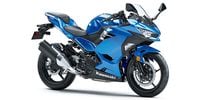Kawasaki is hardly new to the lightweight sportbike market. The Ninja 250R debuted Stateside for 1986 and, after several generations, was finally replaced by the Ninja 300 in 2013. The Ninja 400 then supplanted the Ninja 300 for 2018. Cheaper to buy, finance, insure, and handle than larger sportbikes, the Ninja 400 features a 399cc DOHC parallel twin integrating fuel injection, liquid-cooling, and a six-speed transmission. The extra 35-percent displacement over the Ninja 300 goes a long way toward making a sportbike that can easily match fast-moving traffic, instead of struggling.
Three versions of the Ninja 400 are available for 2018: 1) the base model; 2) an ABS-equipped example for $300 more; and 3) the KRT Edition. Priced another $200 higher, the latter version features Kawasaki Racing Team-style graphics that make it look larger and more venomous than the learner bike it is. If you’re new to sportbikes, on a budget, don’t want to ride too far from home base, or just don’t want or need absolute performance, any one of these Ninja 400s is a logical choice.
Likes: The 103cc boost over the discontinued Ninja 300, twin LED headlights
Dislikes: Conventional fork lags behind inverted-fork technology and performance
Verdict: Affordable entry-level sportbike puts 300cc competitors on the trailer

/cloudfront-us-east-1.images.arcpublishing.com/octane/CZ5OM3E43ZEXJHY7LCYXCHLIKI.jpg)
/cloudfront-us-east-1.images.arcpublishing.com/octane/DF5T4K5KPZFJXFCTGPYR77PKJM.jpg)
/cloudfront-us-east-1.images.arcpublishing.com/octane/RMCT2KVQBJHBZMRTSLOVPMOILU.jpg)

/cloudfront-us-east-1.images.arcpublishing.com/octane/K45KB2XHQVA65DX7VN4ZSMT2BI.jpg)
/cloudfront-us-east-1.images.arcpublishing.com/octane/FNHXQQ56BRD7TO4YIJ453PNG2M.jpg)
/cloudfront-us-east-1.images.arcpublishing.com/octane/OIKJC4JA3ZH7BMKUGWYKBIY5FA.jpg)
/cloudfront-us-east-1.images.arcpublishing.com/octane/MT2SAEWY6FDXFBYSLDE3AEFDTM.jpg)
/cloudfront-us-east-1.images.arcpublishing.com/octane/66UPKPYVURBPRCP5HXSN56MEMM.jpg)
/cloudfront-us-east-1.images.arcpublishing.com/octane/EOREGDSRKFDCRJC6K3EDVHBGCE.jpg)
/cloudfront-us-east-1.images.arcpublishing.com/octane/42RF63Q3LVCMBP3DGTWXFYSMOA.jpg)
/cloudfront-us-east-1.images.arcpublishing.com/octane/XNVY3EVWZFCEVPUGJGAN633LXE.jpg)
/cloudfront-us-east-1.images.arcpublishing.com/octane/2PLTVHXY7FDSPFHKU5CFOC43ZY.jpg)
/cloudfront-us-east-1.images.arcpublishing.com/octane/B6M3WTRLFZGNXBEATNXPVGBBD4.jpg)
/cloudfront-us-east-1.images.arcpublishing.com/octane/4CMH3FI73BEM5D6MFYX42FLDSQ.jpg)
/cloudfront-us-east-1.images.arcpublishing.com/octane/RIHAPYNWU5H3XAOXNOPRWCBTQA.jpg)
/cloudfront-us-east-1.images.arcpublishing.com/octane/HU4NUBCL3VAFZA75VYRCMAUHVM.jpg)
/cloudfront-us-east-1.images.arcpublishing.com/octane/OB43AZK7TRA6XLZL5WRDVW2TDA.jpg)
/cloudfront-us-east-1.images.arcpublishing.com/octane/5G44Y3FXWNFSTEQKCA355PXOPU.jpg)

/cloudfront-us-east-1.images.arcpublishing.com/octane/XRI4GTLCVBA5NESASCBIR5LYQI.jpg)
/cloudfront-us-east-1.images.arcpublishing.com/octane/EF7566PXARGMBAOMLWTECYL3LE.jpg)

